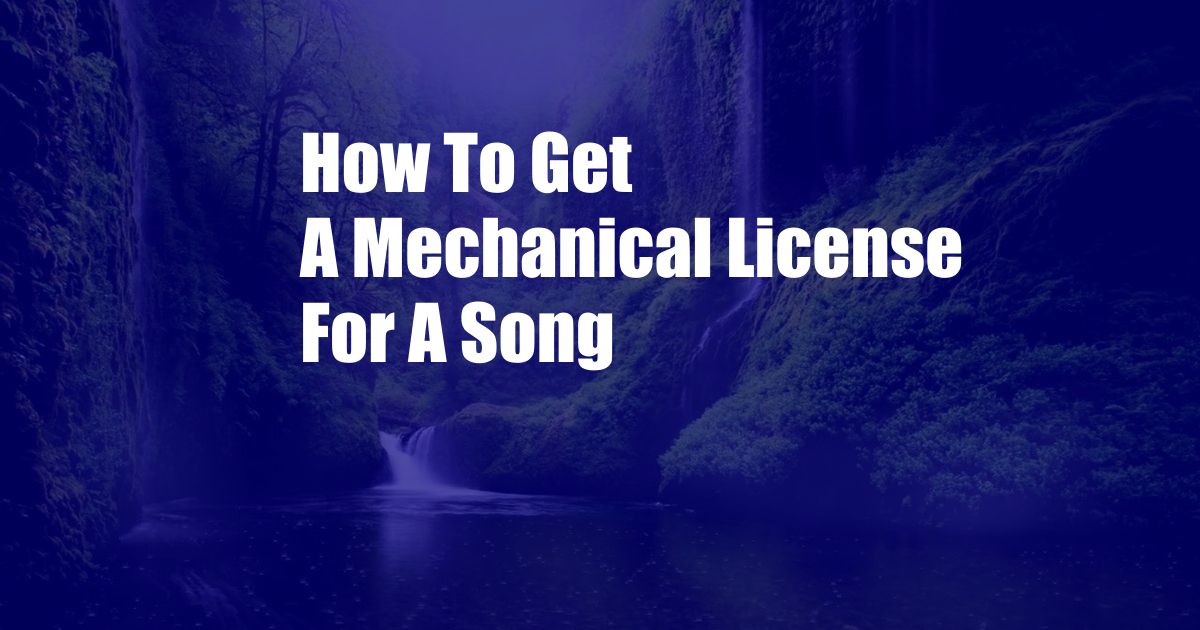
How to Secure a Mechanical License for Your Music
In the world of music, a mechanical license is a legal permission that allows you to reproduce or distribute a copyrighted musical work. Whether you’re a songwriter, musician, or music producer, understanding how to obtain a mechanical license is crucial for ensuring that you’re using copyrighted material legally.
Imagine being a budding artist, ready to share your music with the world. As you prepare to release your first single, you realize that one of your favorite songs contains a sample from a legendary artist. To avoid copyright infringement, you need to secure a mechanical license, a gateway to legally incorporating this piece into your own creation.
Mechanical License: An Overview
Definition, History, and Significance
A mechanical license grants you the rights to reproduce or distribute copyrighted music in physical or digital formats. This includes CDs, vinyl records, digital downloads, and streaming services. Historically, mechanical licenses were primarily used for physical music reproduction. However, with the rise of digital music distribution, they’ve become essential for online music sharing.
Securing a mechanical license is important not only for avoiding copyright infringement but also for ensuring that the original copyright holder receives fair compensation for their work. Without a license, you could face legal consequences and financial penalties.
Process of Obtaining a Mechanical License
Comprehensive Guide
The process of obtaining a mechanical license involves several steps:
- Identify the Copyright Holder: Determine who owns the copyright to the song you wish to use. You can usually find this information on the song’s sheet music or by searching online databases.
- Contact the Copyright Holder: Reach out to the copyright holder and request a mechanical license. You can typically find contact information through performing rights organizations (PROs) or online music licensing platforms.
- Submit Application: Submit an application for a mechanical license to the copyright holder. This application should include details about the song you want to use, the intended use, and the number of copies you intend to distribute.
- Pay the License Fee: Once your application is approved, you’ll need to pay a license fee. This fee varies depending on the song and the intended use.
- Receive License: Upon payment, you’ll receive a mechanical license that grants you the legal right to use the copyrighted material.
Current Trends and Developments
The music industry is constantly evolving, and so are the trends and developments related to mechanical licenses.
- Digital Music Distribution: The rise of digital music distribution has made mechanical licenses more important than ever. With music being consumed primarily online, artists need to secure licenses to distribute their music through streaming services and download platforms.
- Online Music Licensing: Several online platforms have emerged that streamline the process of obtaining mechanical licenses. These platforms provide a centralized marketplace where copyright holders and music users can connect and negotiate licenses.
Tips and Expert Advice
Expert Insights for Success
Based on my experience as a blogger, here are some tips and expert advice for securing a mechanical license:
- Do Your Research: Thoroughly research the copyright holder before reaching out. Make sure you have all the necessary information, including their contact details and any specific requirements they may have.
- Be Respectful and Professional: When contacting the copyright holder, be respectful and professional. Clearly state your intentions and be willing to negotiate reasonable terms.
- Understand the License Terms: Carefully review the terms of the mechanical license before signing. Ensure that you understand the scope of the license, the number of copies you’re allowed to distribute, and any restrictions or limitations.
FAQ
Here are some commonly asked questions about mechanical licenses:
- Q: How long does a mechanical license last?
A: A mechanical license typically lasts for the life of the copyright or a specified number of uses, as determined by the copyright holder. - Q: Can I use a sample of a copyrighted song without a mechanical license?
A: No, using a sample of a copyrighted song without a mechanical license is copyright infringement. You must always obtain permission from the copyright holder before using their material. - Q: Where can I find more information about mechanical licenses?
A: You can find more information about mechanical licenses on the websites of performing rights organizations (PROs) and online music licensing platforms.
Conclusion
Understanding how to obtain a mechanical license empowers music creators to use copyrighted material legally. By following the steps outlined above, you can secure the necessary permissions and avoid copyright infringement.
So, if you’re ready to unleash your musical vision to the world, make sure you take the crucial step of securing a mechanical license. It ensures that both you and the copyright holder are respected and compensated fairly.
Are you interested in learning more about mechanical licenses and other aspects of music licensing? Let us know in the comments below, and we’ll be happy to provide further insights and resources.